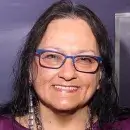
Ms.
Suzan Shown Harjo
The Morning Star Institute
Area
Leadership, Policy, and Communications
Specialty
Scientific, Cultural, and Nonprofit Leadership
Elected
2020
Suzan Shown Harjo (Cheyenne Citizen, Cheyenne & Arapaho Tribes, and Hotvlkvlke Mvskokvlke, Nuyakv) is arguably the most consistent and effective advocate for Native American rights over the last six decades. President of The Morning Star Institute (1984-present)--and former executive director of the National Congress of American Indians (1980s), Native American Rights Fund and Fried, Frank legislative liaison and Carter Administration political appointee--she has helped develop critical legislation, including the American Indian Religious Freedom Act of 1978 and AIRFA Amendments of 1994, the National Museum of the American Indian Act of 1989, the Native American Graves Protection and Repatriation Act of 1990 and the Eastern Land Acts of the Passamaquoddy Tribe, Penobscot Nation and the Mashantucket Pequot Tribal Nation (1980, 1984). A founding trustee of the Smithsonian National Museum of the American Indian, columnist, curator, and poet, Harjo has been at the center of almost every legislative, legal, and cultural issue of import to Native Peoples, including protection of ancestors, children, cultural rights, land, water, and sacred places, as well as the return of over one million acres of Indigenous lands. She had led successful campaigns to eliminate “Native” mascots and themes from American sports since the 1960s, including a quarter-century of overlapping legal actions (1992-2009, 2006-2017, 2010-2017) against the R*dsk*ns name, which was ended in 2020. She also has been in the forefront of re-Indigenizing place names, such as Piestewa Peak (2003-AZ, 2008-US Board Geographic Names, from Sq**w), Little Bighorn Battlefield Monument Act (1990, from Custer), and Black Elk Peak (2016, from Harney). A 2014 Recipient of the Presidential Medal of Freedom, the United States' highest civilian honor, she is Editor and Guest Curator of the book (2014, Smithsonian Books) and award-winning exhibition (2014-2027, NMAI Museum on the Mall) of the same title, "Nation to Nation: Treaties Between the United States and American Indian Nations." She received Honorary Doctorates from the Institute of American Indian Arts (Humanities, 2011) and Princeton University (Humane Letters, 2023), and was inducted into the National Native American Hall of Fame--Advocacy (2022) and the Oklahoma Journalism Hall of Fame and received its Lifetime Achievement Award (2024). She is the first Native woman elected to both the oldest learned societies in the US, the American Academy of Arts and Sciences (1780) (Fellow, 2020) and the American Philosophical Society (1743) (Fellow, 2022). Born in El Reno, Oklahoma, she was raised there in Cheyenne-Arapaho Treaty territory by her maternal grandparents, and on Muscogee allotted farmland on the Muscogee (Creek) Treaty Reservation by her paternal grandparents; and with her parents when they were stationed at Schofield Barracks, Oahu, Hawai'i; Presidio at Monterey, California; and with Allied Forces Southern Europe, NATO, Napoli, Italia. As an adult, she has lived and worked in New York City, where she was a broadcast journalist, producer, and drama & literature director, WBAI-FM Radio, Pacifica Network's flagship free-speech station; in Santa Fe, where she received unprecedented back-to-back residencies in Poetry and as a 2004 Summer Scholar, and where she served on the New Mexico Governor's Commission on Po'Pay to Statuary Hall, US Capitol; and in Washington, DC, where she started as news director, American Indian Press Association, moved to advocacy, and returned to playwriting. Her poetry and other writings are widely anthologized; hundreds of her columns and articles have appeared in mainstream, tribal, and alternative media; and she has written for every version of Indian Country Today, from the original Lakota Times newspaper to the current online ICT.
Last Updated